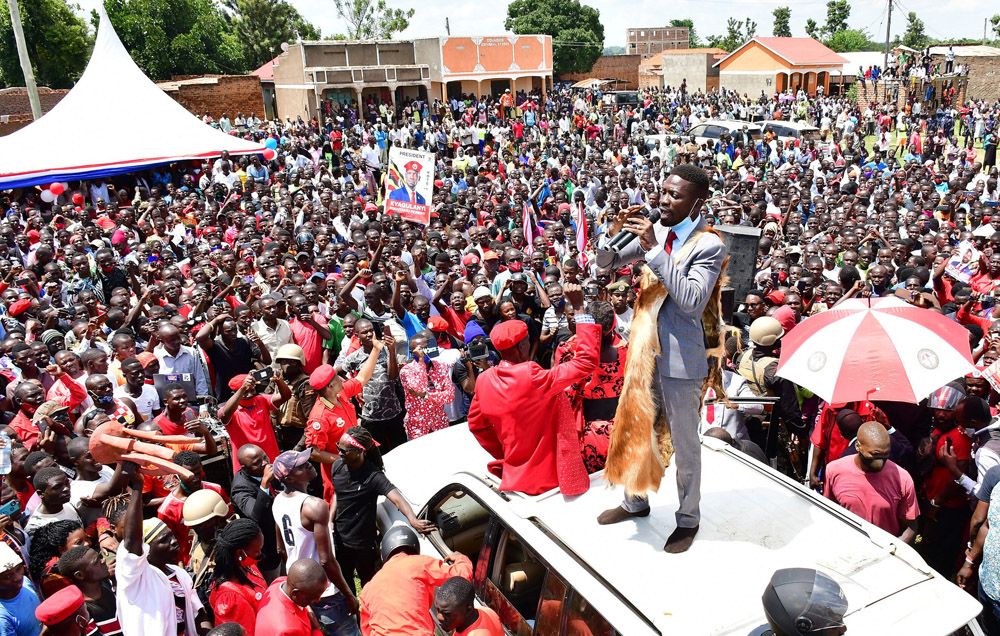Bobi Wine was always capable of captivating a crowd, rising to fame in his native Uganda as a rapper who spoke of the ghetto he grew up in with startling acuity and his success becoming increasing proof that it was possible to make it out. Merely describing reality as it is in the country has felt hard to come by under the rule of Yoweri Museveni, who came to power as a military hero yet proved to be a brute once in power with an atrocious record on human rights and little progress on alleviating poverty while those in government appeared to be lining their pockets, so with a message that resonated, it was never as unexpected as it might seem that Bobi, whose full name is Robert Kyagulanyi Ssentamu, would find immediate success as a politician, first throwing his hat into the ring to become a member of parliament and subsequently setting his sights on the presidency.
“When he turned political, he very quickly was opposing Museveni directly, and there was already a brewing discontent amongst the population, but there was no leader for that that had come in front, and Bobi stepped up and he embodied those beliefs and inspired the whole nation to dream,” says Moses Bwayo, the co-director of “Bobi Wine: The People’s President.” “Lots of people believed in him, and as you see in the film, all these pregnant women in the villages running [up to him] after the rally, trying to show their support, and children and old men — this cuts across all over the country, be it in cities or villages. It was a very dynamic story, changing all the time, developing as we were going.”
Bwayo was on the ground to capture all of it and worked with co-director Christopher Sharp to sort out the inspiring and more often than not harrowing story of the 2021 Ugandan Presidential Elections in which Bobi Wine was the first serious challenger in years to Museveni, whose cronies in Congress removed the constitutional age limit with the aim of extending his reign to six terms in office. The groundswell of support for the artist-turned-presidential hopeful that Bwayo and Sharp document is at odds with the impression one might have from local news coverage, which comes across as just one element of many upholding Museveni’s unshakeable grip on the country, and as they attend rallies where tens of thousands turn out and police are called out to arrest attendees and even the candidates and their staff on vague charges of public disruption, both the words of Bobi Wine and the images “The People’s President” presents can’t be denied.
Beyond answering the question of how many supporters Bobi Wine really has as he battles the perception he’s a fringe candidate, Bwayo and Sharp show the importance of his biggest one in his wife Barbie, whose steadfast belief in him doesn’t preclude constant questions about staying true to the reasons he entered the race in the first place, and through Bobi Wine’s campaign outlines not only the domestic forces that conspire to keep a strongman like Museveni in power, but the international ones as well. After premiering last year at the Venice Film Festival, “Bobi Wine: The People’s President” is arriving in American theaters this week and Bwayo and Sharp generously took the time to talk about how they overcame so many obstacles to bring the story to the screen, having a secret weapon in Bobi Wine’s music and whittling down thousands of hours of footage into its urgent feature-length form.
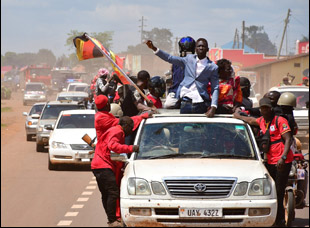
Christopher Sharp: What happened was I grew up in Uganda and my father grew up in Uganda and I knew and loved Bobi’s music. I met Bobi and Barbie at the beginning of 2017, and I just couldn’t believe, firstly, what an incredible couple they were, and secondly, how brave and courageous. Bobi was this very successful musician, willing to give up everything and jeopardize all of that for a cause which was always going to be extremely difficult and extremely dangerous, and then Barbie, his beautiful, intelligent, wonderful wife, was saying, “Yes, we’re going to do this.” It felt like a movie. So then I went to Uganda and I met Moses and a couple of other people who initially helped us with the filming and we slowly started and we filmed for five or six years.
Moses, what attracted you to this?
Moses Bwayo: I had been paying attention to Bobi’s message as a filmmaker and journalist in Uganda, but I wasn’t really involved in politics and when Christopher reached out I was like, “Wow!” I thanked him for making this film and wanting to see it through, so I quickly got on board and followed Bobi Wine. At first, I just thought I’ll make this film and that’s it, but as we went on, I was really inspired by Bobi myself, and just the things he was saying, and asking us all to get involved as Ugandan youth. His voice was resonating with the whole population, and the democratic values that he aspires to, so I [thought], this could be a great leader and more and more I saw that the story was way larger than just a film. It was a moment in history that we were trying to capture and that really pushed me even more to carry on with the filming.
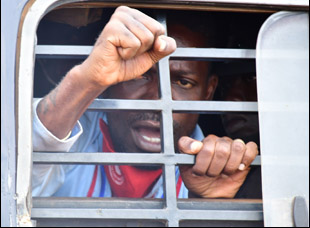
Moses Bwayo: I don’t know if within the five years, there was really [any] coming out of it because it was, as you say, a very strong story, and it became very, very important and very close to me, being from Uganda, and knowing what was happening. As a journalist and filmmaker, it was very hard to come away from. At the beginning, I really didn’t know how violent it could get, There was violence even at the beginning. They had thrown grenades in his compound at some point. They shot [Bobi’s] driver. He was tortured. But as we continued to get into the film, the violence got even more heightened and there was no coming out of it any moment.
I think I could say I came out of the film the morning after I woke up in Los Angeles in 2022, in March on March 16th. That’s when I mentally came out of that film and the story. But being in Uganda underground and working on the film, it was very present to me every time. And we spoke with Chris every day all the time about the story while he was cutting the [film] in the UK, and me being on the ground. We were all the time just in constant conversation, and it was difficult to go away from the story. Also [Bobi’s] supporters were being kidnapped and dropped on the streets, and the violence was happening to people that I really cared about. And in the end, I was caught up in the violence myself. I was locked up in jail and arrested and interrogated. Film equipment was taken away and there was a court case on me. I had to flee the country, and when you’re filming these things, it’s so difficult to know what’s going to be relevant because you really only decide that later. To have just such a massive volume of material and then you’ve got a craft a story, which is under two hours. It’s a challenge.
Christopher Sharp: Yeah, we spent a lot of time editing — over two years, because what happened was we had 4000 hours of footage, and we basically had to decide what story we were going to tell. We sorted through a lot of different routes and we had so much material and so many people who were worthy of being in the story, but ultimately we decided that the most important thing was to stay as close to Bobi and Barbie as possible and to tell as much of the story through them. That meant that we didn’t show so much violence [because] there were a lot of people who had been abused horrendously. For instance, there was a guy who’s actually in America now, who is still suffering a great deal from the torture he suffered, and we interviewed all sorts of people. But eventually it was an editorial decision to come back and keep us close to Bobi and Barbie as possible, [particularly] because the more time we spent with Barbie, the better it was because she is such a wonderful woman. She’s strong and she represents everything that’s really good, so to stay with her as much as possible really resonated.
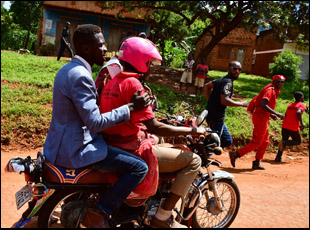
What’s it been like getting the film out into the world?
Christopher Sharp: It’s super exciting. Very few people [outside of Uganda] know anything about Uganda, particularly in Europe and America. Some people don’t know where it is, and it’s also perceived as this far away place where the people are very different to us, and I think when people just realize through the story just how relevant it is and just how extraordinary these people are, it’s really poignant. People have been really touched by Bobi and Barbie and that’s been the most wonderful thing for me, is just seeing how people are moved by them and how they have this very rare ability to communicate with people from anywhere. They give people hope, and they also give people an understanding of what’s going on in Uganda, and that it’s not just Uganda, but so many other places. It’s a story about dictatorial regimes, and also it’s a story about how we in the north and the west are willing to prop up these regimes, so it’s good for people to see where their money’s going.
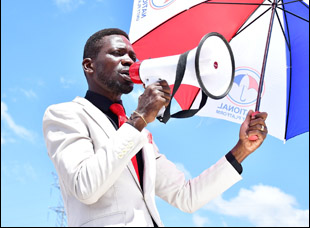
Moses Bwayo: It’s really gratifying to see the attention that our film is receiving internationally and through festivals. It’s a very large story of a country and a people and Bobi and Barbie at the forefront of the revolution. It’s just humbling. And we hope that the world and people around everywhere will get hope and find resilience and say that it’s possible to fight for the general good, and I hope that the world can see these sacrifices that people like Bobi and Barbie make at all costs. As Christopher might have said earlier, Bobi was such an established artist — he had everything and transformed his life from the ghetto to being one of the most successful artists in Eastern Central Africa, but he put everything on the line to be the forefront of this revolution, so I just hope that people around the world can see that resilience and that fight and sacrifice.
“Bobi Wine: The People’s President” opens on July 28th in New York at IFC Center and Los Angeles at the Laemmle Royal and will expand on August 4th to Grapevine, Texas at the AMC Grapevine Mills 24, San Francisco at the Landmark Opera Plaza, Decatur, Georgia at the AMC North Dekalb 16, Houston at the AMC Gulf Pointe 30 and Seattle at the Grand Illusion. A full list of theaters and dates is here.




